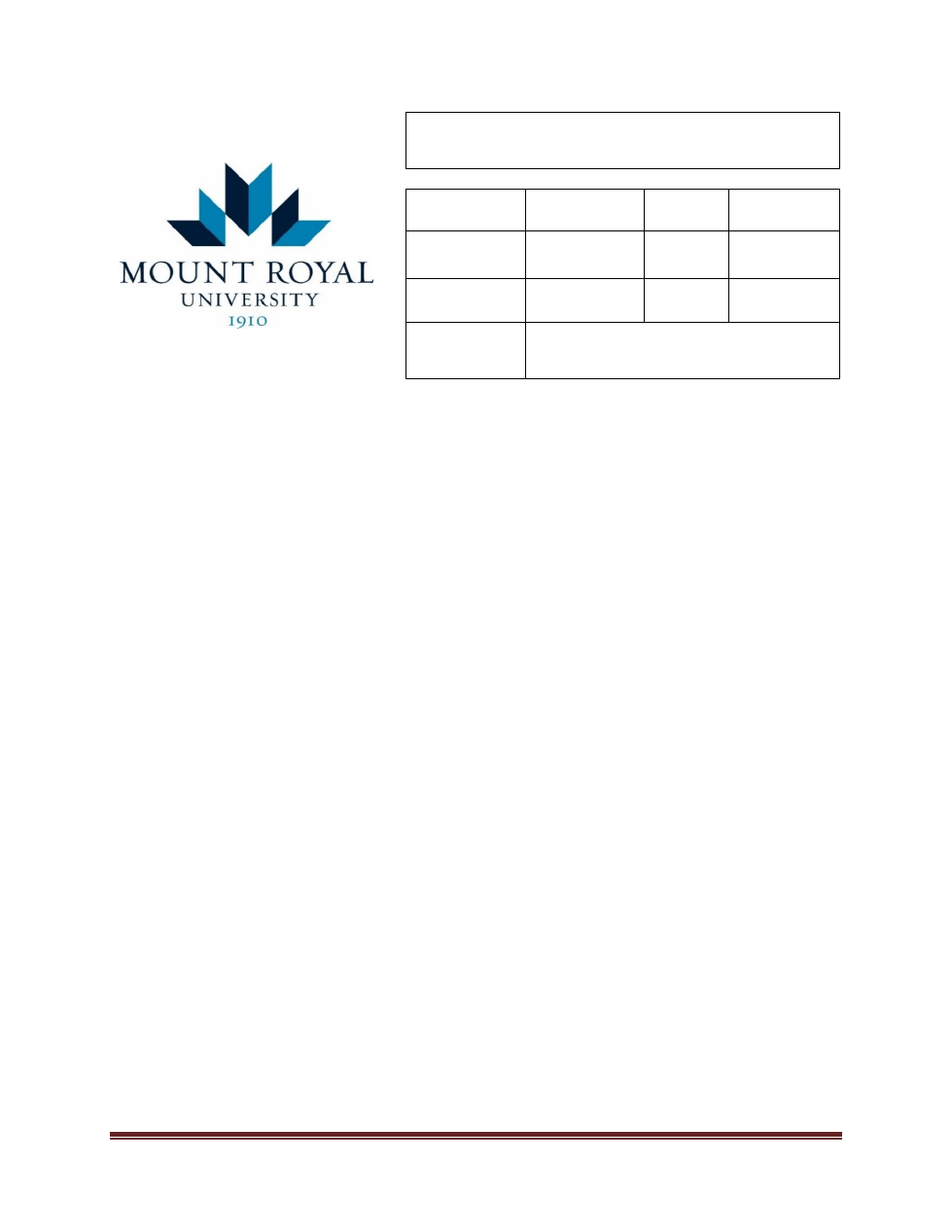
Code of Conduct
– Board of Governors – April 15, 2019
Page 1 of 11
CODE OF CONDUCT
– BOARD OF GOVERNORS
Policy Type:
Board
Initially
Approved:
April 15, 2019
Policy Sponsor:
Board of
Governors
Effective
Date:
July 1, 2019
Primary Contact:
General Counsel
and University
Secretary
Review
Scheduled:
July 2025
Approver:
Board of Governors
A.
OVERVIEW
This Code of Conduct (“Code”) reflects a commitment to Mount Royal University’s values and
provides a framework to guide ethical conduct in a way that upholds our integrity and reputation.
The University is committed to providing a living, learning and working environment that is free of
threats to personal safety and is supportive of productivity, academic achievement, and the dignity,
self-esteem and fair treatment of all members of its community.
B.
PURPOSE
All members of the University’s Board of Governors (“Board”) are expected to behave in a way that
aligns with this Code. While this Code does not cover every scenario, it is the spirit and intent
behind this Code which should guide each person’s conduct. To demonstrate a commitment to
transparency and accountability, this Code is available to the public on the University’s website.
C.
SCOPE
This Code applies to all Board Members.
D.
NOTICE PERIOD
Following approval by the Board, this Code of Conduct will be published by posting on the
University’s public website. The period from the date the Code is made public, until June 30, 2019
will be the public notice period.
This Code will be implemented on July 1, 2019.
E.
POLICY STATEMENT
1.
APPLICATION OF THE CODE
1.1
Employees, including the President, who are serving on the Board of Governors may
have obligations under both the Code of Conduct
– Board of Governors and the
Code of Conduct
– Employees. When acting as a Board Member, they are governed
by the Code of Conduct
– Board Members. When acting as an Employee, they are

Code of Conduct
– Board of Governors – April 15, 2019
Page 2 of 11
governed by the Code of Conduct
– Employees. An individual who is unsure which
Code applies to a given situation should contact the Board Chair. Any questions
about the interpretation or operation of this Code may be addressed to the University
Secretary.
1.2
Breaches of this Code by a Board Member can have serious consequences.
Depending on the severity of the breach, this may necessitate disciplinary action, the
involvement of a third party, and notification of the Minister.
1.3
In the case of a discrepancy or inconsistency between this Code and another
University policy or procedure, the terms of this Code will govern to the extent
necessary to resolve the inconsistency.
2.
ETHICAL CONDUCT
As Board Members owe a fiduciary duty to the University to act in its best interests, they must
act impartially and meet the University’s high Standards of Ethical Conduct.
2.1
STANDARDS OF ETHICAL CONDUCT
a. Board Members must maintain the highest Standards of Ethical Conduct, in
which their actions and behaviours uphold the principles of integrity, respect and
accountability, supported by awareness of and compliance with this Code,
relevant University policies, procedures and government legislation.
b. Board Members are prohibited from acting in self-interest or furthering their
private interests by virtue of their position or through the carrying out of their
Board duties.
c. Board Members must devote sufficient time and attention to their position to
ensure they are informed, performing their duties and meeting their obligations
as Board Members.
d. Board Members must respect the confidentiality of information received in the
performance of their Board duties, including the confidentiality of any In Camera,
or Closed session and discussions and votes of the Board or any committee of
the Board.
e. Ethical obligations of Board Members continue to apply, where appropriate, after
the Board Members leaves the Board.
2.2
REPORTING PROCEDURE
a. Complainants, including Board Members, are encouraged to report perceived
misconduct by a Board Member to the Board Chair. If the complaint involves the
Board Chair, the Board Chair is subject to a related Conflict of Interest, or if there
is a reasonable basis to believe that the Board Chair cannot make an impartial
determination, the report should be made to the Chair of the Audit and Risk
Committee who will then investigate and make a determination in the same
manner as normally assigned to the Board Chair.
b. In circumstances where it is unknown where or whether to report the perceived
misconduct, or where the complainant has reasonable apprehension about
coming forward, inquiries can be made to the Board Chair or to the University
Secretary.

Code of Conduct
– Board of Governors – April 15, 2019
Page 3 of 11
c. The Board Chair will conduct an investigation within a reasonable time of
receiving the report. If the complaint is found to be reasonably made, the Board
Chair will notify the Board Member whom is the subject of the complaint in writing
and provide the particulars of the allegation.
d. Any complainant making a good faith inquiry or complaint will not be subject to
reprisal. A complainant who believes they are subject to reprisal should contact
the Board Chair, or if the alleged reprisal involves the Board Chair, the Chair of
the Audit and Risk Committee.
e. Board Members against whom allegations are made will be treated in a fair and
reasonable manner. If a Board Member subject to an allegation feels this
treatment is not being observed they should contact the Chair, or if the alleged
unfair or unreasonable treatment involves the Board Chair, the Chair of the Audit
and Risk Committee.
f.
If an investigation determines that a Board Member has failed to comply with this
Code, the Board Member may be subject to corrective measures as outlined in
Section
1, “Application of this Code.”
2.3
STATUTORY OBLIGATIONS OF THE BOARD CHAIR
In addition to the obligations owed as a Board Member the Board Chair:
a. must not take part in a decision in the course of carrying out their office or powers
knowing that the decision might further their own private interest, the private
interest of their own minor or adult child, or the private interest of any person
directly associated with them, pursuant to Section 23.925(1) of the Conflicts of
Interest Act;
b. must not use their office or powers to influence or to seek to influence a decision
to be made by or on behalf of the Crown or a public agency to further their own
private interest, the private interest of any person directly associated with them,
the private interest of their minor child, or to improperly further
any other person’s
private interest, pursuant to Section 23.925(2) of the Conflicts of Interest Act;
c. must not use or communicate information not available to the general public that
was gained by them in the course of carrying out their office or powers to further
or seek to further a private interest of their own, or any other person’s private
interest, pursuant to Section 23.924(3) of the Conflicts of Interest Act; and
d. must not fail to appropriately and adequately disclose an Actual or Perceived
Conflict of Interest in the manner specified in this Code, pursuant to Section
23.925(4) of the Conflicts of Interest Act.
3.
CONFLICTS OF INTEREST
Board Members engage in activities and situations where Actual or Perceived Conflicts may
exist. Rather than disallow all Conflicts of Interest, the University assesses whether Conflicts
of Interest can be managed and, where appropriate, permits them as Allowed Conflicts.
Board Members are required to make active and ongoing disclosures to ensure Conflicts of
Interest are appropriately managed.
Conflicts of Interest will only be allowed where they can be managed in a manner that
protects and serves the best interests of the University, withstands reasonable and
independent scrutiny, and is compliant with legislation.

Code of Conduct
– Board of Governors – April 15, 2019
Page 4 of 11
3.1
REQUIREMENT TO REPORT CONCURRENT ACTIVITIES
a. A Board Member involved in a concurrent appointment, business, undertaking,
employment, or self-
employment (collectively “Concurrent Activity”) other than
their Board position with the University may be in a potential Conflict of Interest.
b. Board Members are therefore required to report to the Board Chair all
Concurrent Activity so that the Board Chair may assess the activity to determine
if there is an Actual or Perceived Conflict of Interest.
c. The Board Chair is required to report their own Concurrent Activity to the Ethics
Commissioner.
d. Board Members or the Board Chair may pursue Concurrent Activities without
need for pre-approval, provided the activity does not create an Actual or
Perceived Conflict of Interest, but must notify the Board Chair, or the Ethics
Commissioner in the case of the Board Chair, promptly upon engaging in the
activity.
e. While on the Board, if a Board Member is considering engaging in a Concurrent
Activity, the Board Member is encouraged to consult with the Board Chair for a
preliminary and non-binding opinion as to whether the Concurrent Activity might
conflict with the performance of their duties with the Board and, if so, whether it
may be manageable or not.
f.
If the Board Member proceeds with the Concurrent Activity, the prior consultation
or opinion of the Board Chair does not waive the requirement to self-assess, and
if necessary report, as above.
3.2
DISCLOSURES OF CONFLICTS OF INTEREST
a. Any Board Member engaging in an activity or situation that involves either an
Actual or Perceived Conflict of Interest must immediately disclose the Conflict of
Interest so that it may be assessed and, if appropriate, managed. The disclosure
must be made in writing and submitted to the Board Chair. If the Conflict of
Interest involves the Board Chair, the Board Chair is subject to a related Conflict
of Interest, or if there is a reasonable basis to believe that the Board Chair cannot
make an impartial determination, the disclosure should be made to the Chair of
the Audit and Risk Committee who will then assess and make a determination
in the same manner as normally assigned to the Board Chair.
b. It is the ongoing responsibility of all Board Members to submit regular disclosure
reports as required, and to immediately submit a revised report when there is a
change in the material facts of a previously disclosed report.
c. Notwithstanding the ongoing and active obligation to declare Actual or Perceived
Conflicts of Interest immediately, Board Members must complete annual
declarations that they are free from Conflicts of Interest (other than any Conflict
of Interest being managed as an Allowed Conflict).
d. A Board Member must not engage in, or continue, any activity or situation
identified as an Actual or Perceived Conflict of Interest until the Board Chair has
assessed whether the Conflict of Interest is permitted, and if so, how the Conflict
of Interest will be managed.

Code of Conduct
– Board of Governors – April 15, 2019
Page 5 of 11
e. After receiving a disclosure, the Board Chair will assess the reported Conflict of
Interest and will make a determination as to whether the activity or situation can
be managed as an Allowed Conflict.. Where there is:
i.
no Conflict of Interest, the Board Chair will issue a written response to the
individual indicating that they are free to proceed with the activity or
engage in the situation;
ii.
a Conflict of Interest, and the conflicting activity or situation does not
sufficiently serve the interests or reputation of the University or is not
appropriately manageable or not able to withstand the test of reasonable
and independent scrutiny, the Conflict of Interest will not be allowed and
the Board Chair will issue a written response to the individual indicating
that they are not free to proceed with, or continue to engage in, the activity
or situation.
iii.
a Conflict of Interest, and the activity or situation can be managed as an
Allowed Conflict, a suitable method of monitoring and managing the
Allowed Conflict will be determined and implemented before the Board
Member is free to proceed with, or continue to engage in, the activity or
situation. The Board Chair will issue a written response to the Board
Member and may unilaterally determine the suitable method of monitoring
and managing the Allowed Conflict, or may consult with the Board Member
and any other individuals as appropriate to determine what is suitable.
f.
Where an activity or situation is determined to be an Allowed Conflict, it is
the obligation of the Board Member to ensure the Conflict of Interest remains
manageable and to notify the Board Chair of any material change in
circumstances.
g.
A Board Member with an Actual or Perceived Conflict, whether or not such
Conflict of Interest has been determined to be an Allowed Conflict, must
declare the Conflict of Interest at any Board or committee meeting where the
Conflict of Interest is relevant or may be relevant to the topics of discussion.
The declaration will be included in the minutes of the meeting. A Board
Member must not take part in any discussion or vote on any matter relating
to a Conflict of Interest and must leave the meeting for the period during
which discussion or voting relating to the Conflict of Interest will occur. The
Board Member may be counted for the purposes of quorum for that meeting.
3.3
ACCEPTANCE OF GIFTS EVENT INVITATIONS
a. For the purposes of this section, Gifts and Events do not include:
i.
Normal and nominal Gifts and Event invitations between friends, where
unrelated to the Board Member’s duties or position with the University, or
ii.
attendance at social Events if the social Event is sponsored by a charitable
foundation, a not-for-profit organization, the Governor General of Canada,
a provincial Lieutenant Governor, any Canada federal, provincial,
municipal or regional government or any member of any such government,
or a consul or ambassador of a foreign country.
b. The exception for social Events sponsored for a not-for-profit organization does
not apply to not-for-profit organizations constituted to serve management, union,

Code of Conduct
– Board of Governors – April 15, 2019
Page 6 of 11
or professional interests, or those having a majority of members that are profit-
seeking enterprises or are representatives of profit-seeking enterprises.
c. Any Board Member who is uncertain if acceptance of a Gift or an Event Invitation
is appropriate should contact the Board Chair, or if the Gift is being offered to
the Board Chair, the Chair of the Audit and Risk Committee.
d. If there is uncertainty as to the value of a Gift or an Event, the Vice-President,
Finance and Administration shall have the authority to determine its value.
Acceptance of Gifts
e. Board Members must not accept any Gift directly or indirectly connected with the
performance of their Board duties or by virtue of their position as a Board
Member if the acceptance of the Gift creates an Actual or Perceived Conflict of
Interest. Gifts which are not expected to create a Conflict of Interest are those
received as:
i.
a token received as part of reasonable protocol;
ii.
a social obligation;
iii.
a cultural practice;
iv.
a normal exchange of hospitality between two persons doing business
together; and
v.
as incident for participating in a public Event.
f.
Gifts cannot be in the form of cash or cash equivalents.
g. Board Members must exercise reasonable discretion in determining whether the
acceptance of any Gift is appropriate. A Board Member must never solicit a Gift
in connection with their position or duties.
h. The maximum cash value of any one Gift that a Board Member may accept is
$250, not exceeding $500 per calendar year received from a single source.
i.
If a Gift is also offered to a spouse, adult interdependent partner or minor child
in their capacity as a spouse, adult interdependent partner or minor child of a
Board Member, the same considerations apply as if the Gift was given to the
Board Member directly.
j.
A Board Member may seek an exemption, in writing, from any maximum
valuation set out in this procedure from the Board Chair. The Board Chair may
seek an exemption in writing from the Chair of the Audit and Risk Committee.
An exemption may be sought any time before or within a reasonable time after
accepting a Gift. The party determining whether or not to grant an exemption
will act reasonably in the circumstances and will consider the best interests of
the University in making a determination. An exemption will not be allowed
where there is an Actual or Perceived Conflict of Interest or where acceptance
of the Gift would be contrary to the principles of this Code. Any exemption
granted will be made in writing.
k. Should any Gift be accepted of which the cash value exceeds any maximum
valuation, and there is no exemption approved, the Gift should be returned to

Code of Conduct
– Board of Governors – April 15, 2019
Page 7 of 11
the party who offered it as soon as practical. If returning the Gift is not possible,
or would be socially or culturally unacceptable, the Gift shall be surrendered to
the Vice-President, Finance and Administration and become the property of the
University.
Acceptance of Invitations and Attending Events
l.
Board Members must not accept any invitation to an Event, or attend any Event,
if the acceptance or attendance creates an Actual or Perceived Conflict of
Interest. Events which are not expected to create an Actual or Perceived Conflict
of Interest include those Events:
i.
where a significant cross-section of Board Members have been invited;
ii.
where the Board Member pays for their own food, beverages, and all other
expenses; or
iii.
attended as an incident of the social obligations that normally accompany
the Board Member’s position at the University.
m. Board Members must exercise reasonable discretion in determining whether the
acceptance of any invitation to or attendance at any Event is appropriate.
n. The maximum cash value of attending an Event that a Board Member has been
invited to, inclusive of any food and beverage is:
i.
for the Board Chair:
a) $1,000 per Event, not exceeding $2,000 per calendar year received
from a single source, if the Event invitation is from a donor or potential
donor to the University; or
b) $500 per Event, not exceeding $500 per calendar year received from
a single source, if the Event invitation is from any other person.
ii.
for any other Board Member:
a) $500 per Event, not exceeding $500 per calendar year received from
a single source.
o. If the invitation to attend an Event is extended to a spouse, adult interdependent
partner or minor child, the total cash value of all tickets received are to be taken
into account.
p. If a Board Member is invited to an Event at which the total cash value of
attendance, inclusive of any food and beverage, exceeds any maximum cash
value, the Board Member may seek an exemption in writing from the Board
Chair. If the Board Member invited is the Board Chair, the Board Chair may seek
an exemption in writing from the Chair of the Audit and Risk Committee. The
party determining whether or not to grant an exemption will act reasonably in the
circumstances and will consider the best interests of the University in making a
determination. An exemption will not be allowed where there is an Actual or
Perceived Conflict of Interest or where acceptance of the invitation or attendance
at the Event would be contrary to the principles of this Code. Any exemption
granted will be made in writing.

Code of Conduct
– Board of Governors – April 15, 2019
Page 8 of 11
q. Should a Board Member attend an Event at which the total cash value of
attending exceeds any maximum valuation set out in this Code, and there is no
exemption approved in writing, the cash value of attending the Event, inclusive
of any food and beverage, which exceeds the maximum valuation under this
Code will be reimbursed by the Board Member to the person/entity who originally
covered the cost.
3.4
EXAMPLES OF CONFLICTS OF INTEREST
The following scenarios are examples of an Actual or Perceived Conflict of Interest
which must be disclosed:
a.
A Board Member, who is also an Employee of the University, participates in
discussions at a Board meeting regarding salary and terms and conditions of
staff employment, which they directly draw a benefit from.
b.
A Board Member owns and operates a consulting company that is not directly
related to the University but which provides consulting services to the University
from time to time.
c.
A Board Member is a director or substantial shareholder of a company which
seeks to enter into a for-profit relationship with the University.
d.
A Board Member is offered a volunteer position as the Chair of the board of
directors of a local non-profit organization. The non-profit organization and the
University are occasionally involved in joint initiatives. If the Board Member
accepts the position, this may create a perception of a Conflict of Interest and
as a concurrent appointment to their University Board position, the conflict may
need to be disclosed under the Code. The Board Member is encouraged to
discuss with the Board Chair before accepting the other board position.
This is not a closed nor exhaustive list. When in doubt, Board Members should err
on the side of disclosure.
4.
POLITICAL ACTIVITY
4.1
Board Members engaging in any form of political or related activity must, at all times,
ensure that a perception is not created that the political activity is as a representative
or otherwise on behalf of the University. Should the Board Member become aware
of such perception, the Board Member must immediately rectify it or resign from the
Board.
4.2
Board Members intending to run as a candidate in an election at any level of
government must notify the Board Chair prior to doing so. The Chair will work with
the Board Member to determine whether the Board Member must resign from the
Board, or take a leave of absence pending the outcome of the election.
4.3
A Board Member who is elected to a position at any level of government must
immediately resign from their position on the Board upon confirmation of their
election.

Code of Conduct
– Board of Governors – April 15, 2019
Page 9 of 11
F.
DEFINITIONS
The following definitions apply to this Code of Conduct.
(1)
Actual Conflict of
Interest:
A situation in which there is a divergence between the
private financial benefit or financial interest or personal
benefit of a Board Member, family member, or an outside
party, and that Board Member’s obligations to the
University, such that an impartial observer might
reasonably question whether related actions to be taken
or decisions made by the Board Member would be
influenced by consideration of the Board Member’s own
interests.
(2)
Allowed Conflict:
means conflict that can be managed in a way that is
compliant with legislation, considers, protects and serves
the interests, integrity and reputation of the University,
and will withstand the test of reasonable and
independent scrutiny.
(3)
Board:
means the Board of Governors.
(4)
Board Chair:
means the individual appointed by the Lieutenant
Governor in Council as the Chair of the Board of
Governors.
(5)
Board of Governors:
means Board of Governors of Mount Royal University.
(6)
Board Member:
means the members of the Board of Governors, including
the Chair.
(7)
Code:
means the Code of Conduct
– Board Policy
(8)
Concurrent Activity:
means a concurrent appointment, business, undertaking,
employment, or self-employment other than a Board
Member’s Board position with the University.
(9)
Conflict of Interest:
Arises when individuals are placed in a position whereby
their personal interest conflicts with the best interests of
the University. The test of a Conflict of Interest is not just
a case of whether the individual is actually improperly
influenced by their personal interest, obligation or
objective but the pivotal issue is whether circumstances
lend themselves to such a possibility.
(10)
Employee:
means any individual who works under a contract of
employment with the University, including Senior
Administrators.
(11)
Ethics Commissioner:
means the Officer of the Alberta Legislature appointed to
this role.

Code of Conduct
– Board of Governors – April 15, 2019
Page 10 of 11
(12)
Event:
means social, cultural, or sporting activities, charity or
special functions, presentations, awards ceremonies,
fundraisers, conferences and meeting hosted by a third
party. It includes lunches, dinner, drinks, or other meals
taken together.
(13)
Gift:
means a gift, bonus, reward, or favour of any kind, given
to an individual. It does not include awards received.
(14)
Perceived Conflict:
A Perceived Conflict of Interest exists when there is a
reasonable apprehension, which reasonably well-
informed persons could have, that a Conflict of Interest
exists.
(15)
President:
means the position of President and Vice-Chancellor of
the University
(16)
Standards of Ethical
Conduct:
means actions and behaviours which uphold the
principles of integrity, respect and accountability,
supported by an awareness of and compliance with the
Code, relevant policies and procedures, collective
agreements, applicable legislation and professional
standards.
(17)
University:
means Mount Royal University.
G.
AMENDMENTS
1.
This Code will be submitted to the Ethics Commissioner for review pursuant to section
23.922 of the Conflicts of Interest Act.
2.
Providing approval has been received from the Ethics Commissioner in accordance with
the Conflicts of Interest Act, this Code
will be made public on the University’s website on or
before April 30, 2019.
3.
The University reserves the right to amend this Code at any time, including but not limited
to:
3.1
on the advice or demand of the Office of the Ethics Commissioner; or
3.2
where required to ensure compliance with any changes to the Conflicts of Interest
Act, the Post-secondary Learning Act, or any other applicable legislation or order in
council.
4.
Any amendment or replacement of this Code will be submitted to the Ethics Commissioner
for approval in a manner pursuant to section 23.923(2) of the Conflicts of Interest Act and
any other applicable provisions or legislation.
H.
ADMINISTRATIVE
1.
Any questions about the interpretation or operation of this Code, where not addressed
above, may be addressed to the University Secretary.

Code of Conduct
– Board of Governors – April 15, 2019
Page 11 of 11
2.
All matters regarding the Code will be documented and all documents will be maintained as
records in a manner consistent with the Freedom of Information and Protection of Privacy
Act and other legislation and relevant University policy.
I.
RELATED POLICIES
• Code of Conduct – Employees Policy
J.
RELATED LEGISLATION
• Conflicts of Interest Act, RSA 2000, c.C-23
• Alberta Public Agencies Governance Act, SA 2009, c A-31.5
• Freedom of Information and Protection of Privacy Act, SA 2000, c F-25
• Post-secondary Learning Act, SA 2003,c.P-19.5
• Public Interest Disclosure (Whistleblower Protection) Act, SA 2012, c P-39.5
I.
RELATED INFORMATION
• Confidence Line – a secure process for reporting concerns about professional or financial
misconduct, providing an alternative, anonymous mechanism to normal channels to report
professional or financial misconduct (1.800,661.9675 or
www.mru.confidenceline.net
).
•
Government of Alberta Agency Governance Secretariat:
http://www.alberta.ca/ags-
policies-code-of-condut.cfm
J. REVISION HISTORY
Date
(mm/dd/yyyy)
Description of
Change
Sections
Person who
Entered Revision
(Position Title)
Person who
Authorized
Revision
(Position Title)
04/15/2019
NEW
University Secretary
Board of Governors
01/15/2020
Editorial
Template
Policy Specialist
University Secretary
02/11/2021
Editorial
Title Updates
University Secretary
University Secretary










